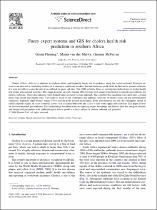 ResearchSpace
ResearchSpace
Fuzzy expert systems and GIS for cholera health risk prediction in southern Africa
JavaScript is disabled for your browser. Some features of this site may not work without it.
- ResearchSpace
- →
- Research Publications/Outputs
- →
- Journal Articles
- →
- View Item
| dc.contributor.author |
Fleming, GJ

|
|
| dc.contributor.author |
Van der Merwe, Martina R

|
|
| dc.contributor.author |
Mcferren, GA

|
|
| dc.date.accessioned | 2007-06-29T08:15:58Z | |
| dc.date.available | 2007-06-29T08:15:58Z | |
| dc.date.issued | 2007 | |
| dc.identifier.citation | Fleming, GJ, Van der Merwe, MR and Mcferren GA. 2007. Fuzzy expert systems and GIS for cholera health risk prediction in southern Africa. Environmental Modelling & Software. Vol. 22(4), pp 442-448 | en |
| dc.identifier.issn | 1364-8152 | |
| dc.identifier.uri | http://hdl.handle.net/10204/770 | |
| dc.description | http://www.sciencedirect.com/science/journal/13648152 | en |
| dc.description.abstract | Cholera (Vibrio cholerae) is endemic in southern Africa and frequently breaks out in epidemics along the eastern seaboard. Extensive resources are directed at combating cholera yet it remains a significant problem. Limited resources could better be directed to prevent outbreaks if it were possible to assess the risk of an outbreak in space and time. The CSIR in South Africa is investigating technologies to predict health risk in line with national priorities. This paper describes an early warning GIS prototype tool aimed at identifying favourable preconditions for cholera outbreaks. These preconditions were defined using an expert system approach. The variables thus identified were input into a spatial fuzzy logic model that outputs risks. The model is based on the assumption that endemic reservoirs of cholera occur and that environmental conditions, especially algal blooms, trigger Vibrio growth in the natural environment. If the preconditions are met, the subsequent spread of cholera depends mainly on socio-economic factors such as human behaviour and access to safe water supply and sanitation. This paper focuses on the environmental preconditions. The methodology described relies on capturing expert knowledge and historic data that integrate climatic and biophysical parameters with epidemiological data to produce a fuzzy surface of cholera outbreak risk potential. | en |
| dc.language.iso | en | en |
| dc.publisher | Elsevier Science Ltd | en |
| dc.subject | Cholera | en |
| dc.subject | Health risk prediction | en |
| dc.subject | Algal bloom | en |
| dc.subject | Expert system | en |
| dc.subject | Fuzzy logic | en |
| dc.title | Fuzzy expert systems and GIS for cholera health risk prediction in southern Africa | en |
| dc.type | Article | en |
| dc.identifier.apacitation | Fleming, G., Van der Merwe, M. R., & Mcferren, G. (2007). Fuzzy expert systems and GIS for cholera health risk prediction in southern Africa. http://hdl.handle.net/10204/770 | en_ZA |
| dc.identifier.chicagocitation | Fleming, GJ, Martina R Van der Merwe, and GA Mcferren "Fuzzy expert systems and GIS for cholera health risk prediction in southern Africa." (2007) http://hdl.handle.net/10204/770 | en_ZA |
| dc.identifier.vancouvercitation | Fleming G, Van der Merwe MR, Mcferren G. Fuzzy expert systems and GIS for cholera health risk prediction in southern Africa. 2007; http://hdl.handle.net/10204/770. | en_ZA |
| dc.identifier.ris | TY - Article AU - Fleming, GJ AU - Van der Merwe, Martina R AU - Mcferren, GA AB - Cholera (Vibrio cholerae) is endemic in southern Africa and frequently breaks out in epidemics along the eastern seaboard. Extensive resources are directed at combating cholera yet it remains a significant problem. Limited resources could better be directed to prevent outbreaks if it were possible to assess the risk of an outbreak in space and time. The CSIR in South Africa is investigating technologies to predict health risk in line with national priorities. This paper describes an early warning GIS prototype tool aimed at identifying favourable preconditions for cholera outbreaks. These preconditions were defined using an expert system approach. The variables thus identified were input into a spatial fuzzy logic model that outputs risks. The model is based on the assumption that endemic reservoirs of cholera occur and that environmental conditions, especially algal blooms, trigger Vibrio growth in the natural environment. If the preconditions are met, the subsequent spread of cholera depends mainly on socio-economic factors such as human behaviour and access to safe water supply and sanitation. This paper focuses on the environmental preconditions. The methodology described relies on capturing expert knowledge and historic data that integrate climatic and biophysical parameters with epidemiological data to produce a fuzzy surface of cholera outbreak risk potential. DA - 2007 DB - ResearchSpace DP - CSIR KW - Cholera KW - Health risk prediction KW - Algal bloom KW - Expert system KW - Fuzzy logic LK - https://researchspace.csir.co.za PY - 2007 SM - 1364-8152 T1 - Fuzzy expert systems and GIS for cholera health risk prediction in southern Africa TI - Fuzzy expert systems and GIS for cholera health risk prediction in southern Africa UR - http://hdl.handle.net/10204/770 ER - | en_ZA |





